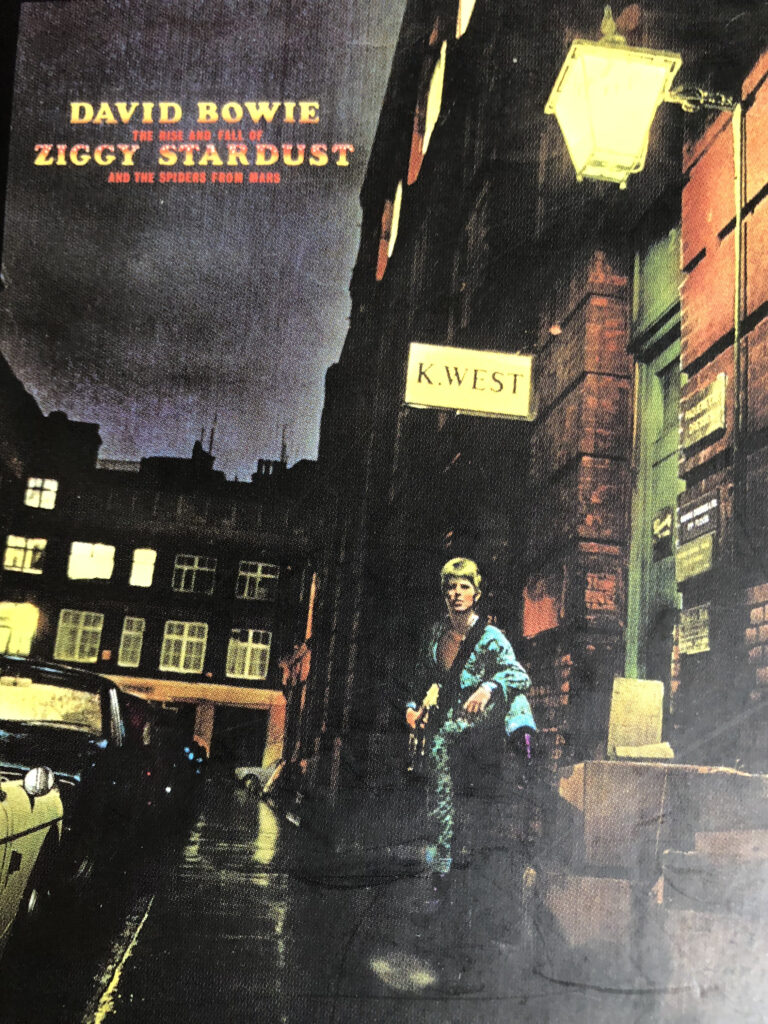Fifty years on from the public first becoming aware of a song called Moonage Daydream, this film arrives carrying the same title. (The poster for it is shown on the home page.) Directed by Brett Morgen, the movie opens perhaps rather pretentiously with Bowie’s voice pondering the philosophies of Friedrich Nietzsche and saying: “How could we fill the space of God that we had created for ourselves?” After a quick fade to black he’s hitting us hard with Hallo Spaceboy from his 1995 album Outside. But as to the former sentence, may it have been instructive that Bowie apparently followed God on Twitter for a few days before his death in January 2016? (I’m sure he knew it wasn’t the real God.)
The film was made with the approval of Bowie’s estate, which is fine in that otherwise it would have not been made but it does seem rather harsh to have completely redacted all references to his first wife, Angie, while giving due credit to his second, Iman. But the mental health issues of his brother, Terry, are included; also his awkward relationship with his mother, Peggy – “We were never that close”. The film gives an insight into Bowie’s capability for self-absorption (not an unusual phenomenon in someone so talented and celebrated), with musings such as regarding “the vast expanse of my imagination”, while also displaying an endearing sense of mischief. During a TV interview in part about Bowie’s sexuality, Russell Harty asks about some ostentatious footwear the star has on. “And what about the shoes? Are they men’s shoes or women’s shoes or bisexual shoes?” Bowie laughs and replies: “They’re shoes shoes, silly.”

As one fan says of Bowie: “You don’t have to be bent to wear make-up.” In the 1970s, that was more of a contentious statement than it would be today. He was speaking outside a concert venue, which takes us to the inevitable fact that the main allure of Morgen’s endeavours is the music. The 135-minute documentary includes 48 newly remastered concert performances, with the title song, The Jean Genie and, naturally, Space Oddity among the numbers in the mix. Pretty much the aforementioned Hallo Spaceboy apart, the film does tend to reinforce the notion that Bowie’s ‘golden years’ concluded with the end of the ’70s; maybe even with the Berlin-inspired 1977 double act of Low and Heroes. It is, however, a measure of the man’s oeuvre that for many lesser artists the quality of the material he produced on subsequent albums could be regarded as career highlights.
If you’re a fan of David Bowie, you will enjoy Moonage Daydream, even while probably accepting that it really doesn’t tell you much that you didn’t already know and acknowledging that rather than the film providing a structured narrative to his life and career, it is in many ways a collection of selected highlights rather cobbled together. In related trivia news, incidentally, last week at an auction in Cheshire, Bowie’s handwritten lyrics for the song Starman, the first single to be taken from that same LP, were sold for just over £200,000. The expectation had been that the item would fetch about £40,000. Approaching seven years since his passing, David Bowie remains very much someone and something that keeps on giving.
